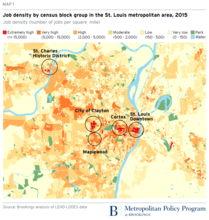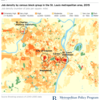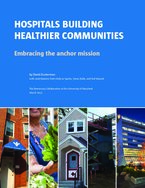0
Report
Community:
Jun 29, 2022
Looking largely at the 2020-2021 school year, the report is chock-full of information about how schools apply research-based strategies in a variety of different contexts – from very different school systems across multiple states – to make research translate into positive experiences and outcomes for students and their teachers in three critical areas:
• Instructional work, where math or English-language-arts teams, including instructional coaches, special-education teachers, and English learner/multilingual teachers, work to improve the quality of instruction within classrooms.
• Early Warning and Response strategies, where grade-level or cross-functional teams work to create more supportive school environments, where young people are connected to adults, each other, and the school community.
• Well-Matched Postsecondary initiatives, where school-based teams of counselors, service providers, district and school leaders, teachers, and other staff band together to implement evidence-based strategies and processes that support postsecondary application, enrollment, and persistence.
At its heart, improvement is about learning. Each of these networks study their own work, and consistently and strategically make adaptations to increase their effectiveness as the organizational hub supporting schools. And they demonstrate how lessons need not fade away, but when codified, systematized, and shared, they can deepen our collective capacity to accelerate the field’s learning and growth.
Authored by:
Topics: Advocacy, Attendance, Child welfare, CLPHA, Community development, Education, Grade-level proficiency, Housing, Literacy, Low-income, Partnerships, Place-based, Supportive housing, Sustainability, Youth
 Shared by Karina George
Shared by Karina George
Karina George posted a
on Jun 29, 2022
Looking largely at the 2020-2021 school year, the report is chock-full of information about how schools apply research-based strategies in a variety of different contexts – from very different school systems across multiple states – to make research translate into positive experiences and outcomes f
0
Research
Community:
Aug 5, 2019
CLPHA developed a general data sharing template that public housing authorities (PHAs) and their health partners can customize to suit their data sharing and collaboration needs. Please feel free to comment to share any uses/modifications your organization made to implement into a partnership.
Authored by:
Topics: Affordable Care Act, CLPHA, Community development, Cost effectiveness, Data sharing, Dental, Depression, Dual-eligibles, Funding, Health, Healthy homes, Legislation & Policy, Low-income, Medicaid / Medicare, Mental health, Metrics, MTW, Nutrition, Obesity, Partnerships, Place-based, Preventative care, Racial inequalities, Research, SAMHSA, Smoke-free, Stability, Substance abuse, Supportive housing, Sustainability, TA
 Shared by Steve Lucas
Shared by Steve Lucas
Steve Lucas posted a
on Aug 5, 2019
Disclaimer: This template is provided for informational purposes only and not for the purpose of providing legal advice. You should contact your attorney to obtain advice with respect to any particular issue or question. Use of this template, including its exhibits and attachments, does not create a relationship or any responsibilities between CLPHA and the user.
CLPHA developed a general data sharing template that public housing authorities (PHAs) and their health partners can customize to suit their data sharing and collaboration needs. Please feel free to comment to share any uses/modifications your organization made to implement into a partnership.
1
News Article
Community:
Jun 11, 2018
At a recent public meeting, Sandra Lee Fewer, a member of the city’s Board of Supervisors, asked acting librarian Michael Lambert to explore whether future library renovations might include affordable housing. Fewer hopes to leverage existing public land to create multi-story facilities that include both libraries and housing.
Authored by: Steve Dubb for NPQ
Topics: Community development, Homelessness, Housing, Literacy, Low-income, Partnerships, Place-based, Research, Youth
 Shared by Housing Is
Shared by Housing Is
Housing Is posted a
on Jan 29, 2019
At a recent public meeting, Sandra Lee Fewer, a member of the city’s Board of Supervisors, asked acting librarian Michael Lambert to explore whether future library renovations might include affordable housing.
0
Publication
Community:
Mar 28, 2018
Communities can leverage local housing and neighborhood policies to address gun violence through tools such as demolition, vacant property maintenance and reuse, foreclosure mitigation counseling, homeownership support programs, code enforcement, and zoning.
Authored by: Christina Plerhoples Stacy for How Housing Matters
Topics: Community development, Housing, Partnerships, Place-based, Safety
 Shared by Housing Is
Shared by Housing Is
Housing Is posted a
on Dec 20, 2018
Christina Plerhoples Stacy for How Housing Matters
Communities can leverage local housing and neighborhood policies to address gun violence through tools such as demolition, vacant property maintenance and reuse, foreclosure mitigation counseling, homeownership support programs, code enforcement, and zoning.
0
Podcast
Community:
Leah Hendey, MPP, Senior Research Associate at the Urban Institute, joined the podcast to reflect on her experiences co-directing the National Neighborhood Indicators Partnership (NNIP), a nationwide effort to advance the use of neighborhood-level data to drive local decision-making. NNIP is led by the Urban Institute and a network of 32 partners representing local data intermediaries across the country. Hendey discussed the role local data intermediaries play in their communities, explained how neighborhood-level data can be used to understand and address issues of health equity, and shared examples of communities that have successfully used neighborhood information systems in innovative ways to solve pressing public health challenges.
Authored by: All In: Data for Community Health
Topics: Community development, Data sharing, Health, Partnerships, Place-based
 Shared by Mica O'Brien
Shared by Mica O'Brien
Mica O'Brien posted a
on Dec 17, 2018
All In: Data for Community Health
Leah Hendey, MPP, Senior Research Associate at the Urban Institute, joined the podcast to reflect on her experiences co-directing the National Neighborhood Indicators Partnership (NNIP), a nationwide effort to advance the use of neighborhood-level data to drive local decision-making.
0
News Article
Community:
Dec 14, 2018
Opportunity zones are home to approximately 35 million Americans. It is estimated that the opportunity-zone designation could attract $100 billion in private investment in these areas, which would go a long way to spurring economic development and creating jobs.
Authored by: Ben Carson for The New York Times
Topics: Community development, Legislation & Policy, Partnerships, Place-based, Racial inequalities, RAD
 Shared by Mica O'Brien
Shared by Mica O'Brien
Mica O'Brien posted a
on Dec 17, 2018
Ben Carson for The New York Times
Opportunity zones are home to approximately 35 million Americans. It is estimated that the opportunity-zone designation could attract $100 billion in private investment in these areas, which would go a long way to spurring economic development and creating jobs.
0
Interactive
Community:
The 2018 Purpose Built Conference in Orlando, Florida from October 24 – 26 was a tremendous opportunity for thoughtful engagement and energetic conversations with Network Members and attendees from all across the country. Our panel of guest speakers represented a wide range of industries and brought unique perspectives and insights.
Authored by: Purpose Built Communities
Topics: Community development, Education, Health, Housing, Low-income, Mobility, Partnerships, Place-based
 Shared by Mica O'Brien
Shared by Mica O'Brien
Mica O'Brien posted a
on Dec 5, 2018
Purpose Built Communities
The 2018 Purpose Built Conference in Orlando, Florida from October 24 – 26 was a tremendous opportunity for thoughtful engagement and energetic conversations with Network Members and attendees from all across the country.
0
Publication
Community:
Nov 14, 2018
In collaboration with Project for Public Spaces (PPS), the National Main Street Center (NMSC), and others, the Bass Center will examine the place needs of people and businesses and use that knowledge to help public, private, and civic sectors leaders develop new approaches to creating and supporting concentrations of economic activity that drive inclusive economic growth. The Center is premised on the idea that these “economic districts” represent the geographies in which leaders can have the most transformative impact—where they can build local trust and understanding, experiment safely, show results early and often, and measure impact against a place-centered vision and goals.
Authored by: Jennifer S. Vey for The Brookings Institution
Topics: Community development, Low-income, Mobility, Partnerships, Place-based
 Shared by Mica O'Brien
Shared by Mica O'Brien
Mica O'Brien posted a
on Dec 5, 2018
Jennifer S. Vey for The Brookings Institution
In collaboration with Project for Public Spaces (PPS), the National Main Street Center (NMSC), and others, the Bass Center will examine the place needs of people and businesses and use that knowledge to help public, private, and civic sectors leaders develop new approaches to creating and supporting
0
Interactive
Community:
Nov 29, 2018
With political divisions on the rise and global cooperation imperiled, city officials worldwide are stepping up to lead, solving local problems while sharing solutions and innovations across borders. Making cities such as New York, Pittsburgh, and Los Angeles inclusive, safe, and sustainable is vital to the future of the United States—and the globe. Driven by the need to act locally while thinking globally, a growing number of metro areas are adapting the Sustainable Development Goals (SDGs) as a blueprint for progress.
Authored by: The Brookings Institution
Topics: Community development, Housing, Partnerships, Place-based, Sustainability
 Shared by Mica O'Brien
Shared by Mica O'Brien
Mica O'Brien posted a
on Dec 3, 2018
The Brookings Institution
With political divisions on the rise and global cooperation imperiled, city officials worldwide are stepping up to lead, solving local problems while sharing solutions and innovations across borders.
0
Interactive
Community:
Nov 14, 2018
After decades of sprawl and suburban dominance, U.S. cities are experiencing rebounding populations, growing employment, and new public and private sector investments in places that are walkable, transit-oriented, and support diverse people and amenities. But we know that the benefits of these trends are not equally distributed, presenting an urgent opportunity for local and regional leaders to advance place-led development that produces better economic outcomes for more people in more places.
To help deliver on that imperative, the Metropolitan Policy Program at Brookings launched the Anne T. and Robert M. Bass Center for Transformative Placemaking (“Bass Center”) with an event on Wednesday, November 14. In collaboration with Project for Public Spaces (PPS) and the National Main Street Center (NMSC), the Bass Center will inspire public, private, and civic sector leaders to make transformative place investments that generate widespread social and economic benefits. Brookings President John Allen, Bass Center Director and Senior Fellow Jennifer Vey, special guest speaker Carol Coletta, and a distinguished panel of experts discussed how market and demographic trends are driving new demands for placemaking that benefit more people and places.
Authored by: The Brookings Institution
Topics: Community development, Housing, Partnerships, Place-based, Safety, Stability
 Shared by Mica O'Brien
Shared by Mica O'Brien
Mica O'Brien posted a
on Nov 19, 2018
The Brookings Institution
After decades of sprawl and suburban dominance, U.S. cities are experiencing rebounding populations, growing employment, and new public and private sector investments in places that are walkable, transit-oriented, and support diverse people and amenities.
0
Report
Community:
Oct 24, 2018
CLPHA’s Housing Is Initiative is engaged in a number of cross-sector activities focused on developing partnerships, facilitating a community of practice, resource development, promoting best practices, online collaboration, policy and advocacy, and training and education. Read about recent activities in this Fall Update.
Authored by:
Topics: Child welfare, CLPHA, Community development, Cost effectiveness, Data sharing, Early childhood, Education, Family engagement, Funding, Health, Homelessness, Housing, Low-income, Medicaid / Medicare, Mental health, Partnerships, Place-based, Post-secondary, Research, Stability, Substance abuse, Workforce development, Youth
 Shared by Mica O'Brien
Shared by Mica O'Brien
Mica O'Brien posted a
on Oct 24, 2018
CLPHA’s Housing Is Initiative is engaged in a number of cross-sector activities focused on developing partnerships, facilitating a community of practice, resource development, promoting best practices, online collaboration, policy and advocacy, and training and education.
0
News Article
Community:
Oct 9, 2018
Sweet Water Foundation transformed four blocks in Englewood to cultivate community and help build skills, resources, and opportunities for residents.
Authored by: MacArthur Foundation
Topics: Community development, Family engagement, Food insecurity, Green, Health, Low-income, Midwest, Nutrition, Partnerships, Place-based, Sustainability, Youth
 Shared by Mica O'Brien
Shared by Mica O'Brien
Mica O'Brien posted a
on Oct 24, 2018
Sweet Water Foundation transformed four blocks in Englewood to cultivate community and help build skills, resources, and opportunities for residents.
0
Case study
Community:
Sep 25, 2018
Practitioners working on community safety have increasingly incorporated creative placemaking techniques into their work. Creative placemaking refers to the ways in which arts and culture change how people use the places they share.
Authored by: Mark Treskon for Urban Institute
Topics: Community development, Criminal justice, Low-income, Out-of-school time, Partnerships, Place-based
 Shared by Mica O'Brien
Shared by Mica O'Brien
Mica O'Brien posted a
on Oct 10, 2018
Mark Treskon for Urban Institute
Practitioners working on community safety have increasingly incorporated creative placemaking techniques into their work. Creative placemaking refers to the ways in which arts and culture change how people use the places they share.
0
News Article
Community:
Oct 8, 2018
A strategy for community problem-solving does an extraordinary job at restoring our social fabric.
Authored by: David Brooks for The New York Times
Topics: Community development, Education, Partnerships, Place-based, Youth
 Shared by Mica O'Brien
Shared by Mica O'Brien
Mica O'Brien posted a
on Oct 10, 2018
David Brooks for The New York Times
A strategy for community problem-solving does an extraordinary job at restoring our social fabric.
0
Research
Community:
Jul 19, 2018
The link between federal housing policy and public health has been understood since the nineteenth century, when housing activists first sought to abolish slums and create healthful environments. This article describes how the Obama administration—building on these efforts and those that followed, including the Great Society programs of President Lyndon Johnson—has adopted a cross-sector approach that takes health considerations into account when formulating housing and community development policy. The federal Department of Housing and Urban Development fully embraces this “health in all policies” approach. Nonetheless, the administration’s strategy faces challenges, including fiscal and political ones. Some of these challenges may be overcome by conducting quality research on how housing and community development policies affect health outcomes, and by developing a federal budget strategy that takes into account how investments in one sector contribute to cost savings in another.
Authored by:
Topics: Affordable Care Act, Community development, Disabilities, Health, Healthy homes, Housing, Legislation & Policy, Low-income, Mobility, Partnerships, Place-based, RAD, Research
 Shared by Housing Is
Shared by Housing Is
Housing Is posted a
on Jul 19, 2018
The link between federal housing policy and public health has been understood since the nineteenth century, when housing activists first sought to abolish slums and create healthful environments.
0
Research
Community:
Jul 13, 2018
Hospitals Building Healthier Communities aims to provide a resource for hospitals considering adopting or further integrating community engagement and economic development into their daily operations and their core mission.
Authored by:
Topics: Community development, Data sharing, Health, Housing, Low-income, Partnerships, Place-based, Research
 Shared by Housing Is
Shared by Housing Is
Housing Is posted a
on Jul 13, 2018
Hospitals Building Healthier Communities aims to provide a resource for hospitals considering adopting or further integrating community engagement and economic development into their daily operations and their core mission.
0
Case study
Community:
Jul 13, 2018
The Conway Center is a project of a nonprofit housing and services organization, So Others Might Eat, and a federally qualified health center, Unity Health Care, in Washington, DC. This $90 million community development initiative will colocate employment training, health care services, and affordable housing under one roof in Ward 7, an area of DC experiencing high poverty and unemployment, and poor health outcomes. The partnership aims to improve access to affordable rental housing, increase livable-wage job attainment, and connect residents to high-quality health care services. Although still under construction, this partnership highlights how a shared vision among community-serving organizations and funders can result in a comprehensive strategy for improving resident health and well-being
Authored by:
Topics: Community development, Cost effectiveness, Food insecurity, Health, Housing, Low-income, Medicaid / Medicare, Partnerships, Place-based, Stability
 Shared by Housing Is
Shared by Housing Is
Housing Is posted a
on Jul 13, 2018
The Conway Center is a project of a nonprofit housing and services organization, So Others Might Eat, and a federally qualified health center, Unity Health Care, in Washington, DC.
0
Case study
Community:
Jul 12, 2018
The Trauma Informed Community Building (TICB) model is based on BRIDGE Housing Corporation’s experience doing community building work over the past five years in the Potrero Terrace and Annex public housing sites in San Francisco, CA.
Authored by:
Topics: Child welfare, Community development, Dual-generation, Family engagement, Low-income, Mental health, Partnerships, Place-based, Preventative care, Research, Safety
 Shared by Housing Is
Shared by Housing Is
Housing Is posted a
on Jul 12, 2018
The Trauma Informed Community Building (TICB) model is based on BRIDGE Housing Corporation’s experience doing community building work over the past five years in the Potrero Terrace and Annex public housing sites in San Francisco, CA.
0
Case study
Community:
Jul 10, 2018
Reducing Pediatric Asthma through Home Improvements and Education
Authored by:
Topics: Asthma, Child welfare, Community development, Cost effectiveness, Data sharing, Early childhood, Education, Family engagement, Health, Healthy homes, Housing, Low-income, Medicaid / Medicare, Metrics, Partnerships, Place-based, Preventative care, Research, Safety
 Shared by Housing Is
Shared by Housing Is
Housing Is posted a
on Jul 10, 2018
Reducing Pediatric Asthma through Home Improvements and Education
0
Interactive
Community:
Dec 21, 2017
Authored by: Domenick Lasorsa for the National League of Cities
Topics: Community development, Cost effectiveness, Housing, Legislation & Policy, Low-income, Metrics, Partnerships, Place-based, Research, Stability, Workforce development
 Shared by Housing Is
Shared by Housing Is
Housing Is posted a
on Jul 5, 2018
Domenick Lasorsa for the National League of Cities
0
Report
Community:
Nov 1, 2017
Why do some neighborhoods appear able to launch effective local improvement initiatives, while others are more hampered by fragmentation and mistrust? Why can some communities mobilize diverse constituencies to influence public policy, while others cannot? Answers to these questions may be found in the specific patterns of collaboration that form among community organizations, and between these groups, schools, public agencies, and elected officials, according to MDRC, a preeminent social-policy research organization.
Authored by: MDRC
Topics: Asset building, Child welfare, Community development, Data sharing, Dual-generation, Education, Family engagement, Funding, Health, Housing, Legislation & Policy, Low-income, Metrics, Midwest, Mobility, Out-of-school time, Partnerships, Place-based, Preventative care, Research, Safety, Stability, Workforce development, Youth
 Shared by Mica O'Brien
Shared by Mica O'Brien
Mica O'Brien posted a
on Jun 29, 2018
Why do some neighborhoods appear able to launch effective local improvement initiatives, while others are more hampered by fragmentation and mistrust? Why can some communities mobilize diverse constituencies to influence public policy, while others cannot?
1
Video
Community:
May 23, 2018
The Council of Large Public Housing Authorities (CLPHA) hosted The Housing Is Summit in Washington, D.C., on May 3-4, 2018 with 300 partners across the housing, education, and healthcare sectors. Access video recordings of the Summit's keynote speakers (HUD Secretary Ben Carson, John Bridgeland, Matthew Morton), plenary panels (on topics that cut across sectors like anchor institutions, data collaboration, stability, and foundation investments), and select breakout sessions focused on the intersections of housing, education, and health.
Authored by: Council of Large Public Housing Authorities
Topics: Affordable Care Act, Attendance, Child welfare, CLPHA, Community development, Data sharing, Dual-eligibles, Dual-generation, Early childhood, Education, Funding, Grade-level proficiency, Health, Healthy homes, Homelessness, Housing, Legislation & Policy, Low-income, Medicaid / Medicare, Mental health, Metrics, MTW, Out-of-school time, Partnerships, Place-based, Preventative care, Racial inequalities, Research, School-readiness, Seniors, Stability, Substance abuse, Supportive housing, Sustainability, TA, Workforce development, Youth
 Shared by Steve Lucas
Shared by Steve Lucas
Steve Lucas posted a
on May 23, 2018
The Council of Large Public Housing Authorities (CLPHA) hosted The Housing Is Summit in Washington, D.C., on May 3-4, 2018 with 200 partners across the housing, education, and healthcare sectors. The Summit highlighted the ways that we can transform systems to better serve low-income people with two days of plenary speakers/panels, breakout sessions, and caucus discussions geared toward intersectional thinking and ways to take action.
Council of Large Public Housing Authorities
The Council of Large Public Housing Authorities (CLPHA) hosted The Housing Is Summit in Washington, D.C., on May 3-4, 2018 with 300 partners across the housing, education, and healthcare sectors.
0
Webinar
Community:
Feb 21, 2018
Presentation from CLPHA's February 2018 Health Strategic Planning Workshop, co-facilitated with Health Impact Project and Grantmakers in Health
Authored by: CLPHA, Health Impact Project (Pew/RWJF), and Grantmakers in Health
Topics: Affordable Care Act, CLPHA, Community development, Data sharing, Health, Healthy homes, Homelessness, Housing, Medicaid / Medicare, Mental health, Obesity, Partnerships, Place-based, Research, Supportive housing, TA
 Shared by Steve Lucas
Shared by Steve Lucas
Steve Lucas posted a
on Feb 27, 2018
The 2018 CLPHA Health Strategic Planning Workshop, co-facilitated with Health Impact Project (a collaboration of Pew Charitable Trusts and Robert Wood Johnson Foundation) and Grantmakers in Health, convened over 35 communities across the country. Participating teams included internal PHA staff at member agencies who work on health-related initiatives as well as external partners that provide services, education, and other health resources for residents.
CLPHA, Health Impact Project (Pew/RWJF), and Grantmakers in Health
Presentation from CLPHA's February 2018 Health Strategic Planning Workshop, co-facilitated with Health Impact Project and Grantmakers in Health
 Shared by Karina George
on Jun 29, 2022
Shared by Karina George
on Jun 29, 2022
 Shared by Steve Lucas
on Aug 5, 2019
Shared by Steve Lucas
on Aug 5, 2019

 Shared by Housing Is
on Jan 29, 2019
Shared by Housing Is
on Jan 29, 2019

 Shared by Housing Is
on Dec 20, 2018
Shared by Housing Is
on Dec 20, 2018








 Shared by Housing Is
on Jul 19, 2018
Shared by Housing Is
on Jul 19, 2018
 Shared by Housing Is
on Jul 13, 2018
Shared by Housing Is
on Jul 13, 2018
 Shared by Housing Is
on Jul 13, 2018
Shared by Housing Is
on Jul 13, 2018
 Shared by Housing Is
on Jul 12, 2018
Shared by Housing Is
on Jul 12, 2018
 Shared by Housing Is
on Jul 10, 2018
Shared by Housing Is
on Jul 10, 2018
 Shared by Housing Is
on Jul 5, 2018
Shared by Housing Is
on Jul 5, 2018


 Shared by Steve Lucas
on May 23, 2018
Shared by Steve Lucas
on May 23, 2018
 Shared by Steve Lucas
on Feb 27, 2018
Shared by Steve Lucas
on Feb 27, 2018










